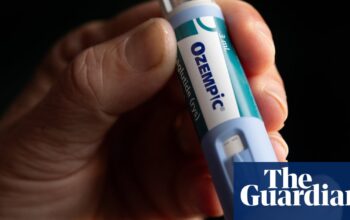
The head of Iceland has criticized the “exploitation” of new parents and has joined in the demand for a limit on the cost of baby formula, following the discovery by the competition authority of evidence of inflated prices by major producers.
On Wednesday, the CMA announced that manufacturers had raised prices above their expenses during the inflation crisis, resulting in higher profit margins and a 25% average price hike for consumers over a two-year period. The agency expressed concern that competition may be limited due to the market being heavily controlled by two companies, Danone and Nestlé, who make up 85% of sales.
According to Richard Walker, the executive chair of Iceland, this behavior is exploitative and must be put to an immediate end.
There is a widespread problem of high living expenses. Certain individuals are unable to provide nourishment for their infants. This is a pressing matter with tangible repercussions, and action must be taken. The current price for a week’s worth of baby formula is £14.50, which is unreasonable and unaffordable for many. It is unrealistic to suggest that breast milk is a viable alternative, as not everyone is able to rely on it.
Walker suggested that the government organize a meeting with various brands and retailers to discuss and establish price regulations. He stated that this course of action seems like a sensible solution.
The First Steps Nutrition Trust has recommended implementing a price limit and launching a public health campaign to emphasize the nutritional value of all first infant formula. This formula is regulated and must meet strict standards, regardless of its cost or brand.
In August, the research conducted by the company revealed notable variations in prices among different brands. For cow’s milk-based formula, the cost per 100ml ranged from 13p for the most affordable option, Cow & Gate First Infant Milk (1,200g pack), to 35p for the priciest choice, Aptamil’s 1 First Milk Tab (552g pack).
The rate at which prices increased differed, as a 800g pack of Danone’s Aptamil formula increased by 26% to approximately £14.50 from March 2021 to April 2023. The price of a 800g pack of Cow & Gate 1 also rose by 31% to around £10.50 during this time frame, while a 900g pack of Aldi’s Mamia brand increased by 45% to about £9.40.
Currently, companies bypass advertising restrictions on infant formula by promoting “follow-on milk” – a type of formula marketed towards toddlers who do not require a specific beverage for their well-being.
Walker suggested that making changes to marketing restrictions could help alleviate the burden on parents. This could involve retailers allowing customers to purchase infant formula with loyalty points or food bank vouchers, as well as permitting promotional offers.
Walker said Iceland was now accepting loyalty scheme points and had slashed its prices by 20%, in effect selling infant formula at the cost price. He said Iceland had done this despite the risk of breaking rules on promoting formula by highlighting the price cut in stores this summer.
He stated that there should be less limitations, as he is able to advertise for vaping or chocolate but not formula.
Prominent individuals are also urging for measures to be taken regarding the cost of formula. In the previous month, Wes Streeting, the opposition health secretary, stated that the advertising rules were no longer suitable.
He stated that under Labour, retailers would have the option to use loyalty cards and vouchers as a form of payment for infant formula in order to assist families in providing nourishment for their children.
The CMA plans to further examine the baby formula industry due to its susceptibility to price increases that exceed inflation rates. This is mainly due to the presence of only one UK retailer – Aldi – that offers their own brand of formula. The investigation revealed that competition in the market was hindered by consumers’ strong loyalty to specific brands, whether it be due to recommendations from loved ones or their baby’s preference for a particular type.
The watchdog discovered that individuals who switch could potentially save up to £500 per year. It also noted that yearly expenses may be inflated due to manufacturers’ recommended feeding amounts, which are consistently higher than those suggested by the Scientific Advisory Committee on Nutrition.
Walker noted that Iceland had previously tried a unique formula under their own label, but it was not successful as customers preferred to purchase familiar brands.
A representative from Kendamil, a UK-based brand that holds 9% of the market, expressed support for the CMA investigation. The report is expected to be released in early 2021. The spokesperson noted that Danone and Nestlé’s dominant presence in the market creates a concentration of supplier power, resulting in monopolistic market dynamics, limited supply diversification, and unjustifiable pricing strategies.
“The Kendamil spokesperson stated that competing against large multinational conglomerates, with a combined yearly profit of more than £15 billion, is a difficult and often unfriendly task. They also expressed support for the CMA’s belief that a lack of competition is hindering parents who are facing financial struggles during a cost of living crisis.”
The largest company in the UK baby formula industry, Danone UK & Ireland, which produces Cow & Gate and Aptamil, stated that the UK market is highly competitive. They understand the difficulties that parents are facing due to inflation. Despite this, they have made efforts to absorb the rising costs and find ways to save money in order to minimize any price hikes.
Nestlé expressed its support for the CMA examination and stated its willingness to engage in productive discussions to assist parents in the most efficient manner possible.
Source: theguardian.com


